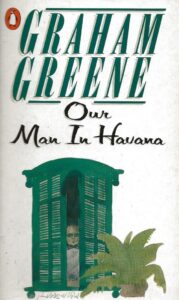Graham Greene: A Literary Luminary Unveiled
Graham Greene, the celebrated British author known for his captivating stories and deep understanding of human nature, continues to intrigue readers as a mysterious figure in the world of literature.
With a writing career spanning more than five decades, his impactful works have made a lasting impression on readers across the globe.
Let’s take a look at some significant glimpses into the life and enduring influence of this remarkable literary icon:
Early Life and Education
Graham Greene, born in Berkhamsted, Hertfordshire on October 2, 1904, came from a family with a headmaster father.
Growing up in a profoundly religious home had a profound impact on his perspective and future literary subjects.
Following his time at Balliol College, Oxford, Greene dabbled in journalism before dedicating himself fully to his writing profession.
Prolific Literary Career
Graham Greene was a prolific writer, delving into various literary genres such as novels, plays, screenplays, and essays.
Throughout his career, he penned more than 25 novels, which include renowned works like Brighton Rock, The Power and the Glory, and The End of the Affair.
His exceptional versatility enabled him to tackle diverse themes, encompassing espionage, political intrigue, faith, and morality.
Exploration of Faith
Greene, brought up in a devoutly Catholic family, wrestled with matters of faith and uncertainty throughout his existence.
In his literary works, he frequently delves into the intricacies of religious conviction, portraying characters who grapple with ethical quandaries and existential struggles.
Novels such as The Power and the Glory and The End of the Affair delve profoundly into these subjects, revealing Greene’s nuanced comprehension of spirituality.
Political Themes
Graham Greene, being an astute observer of the political scene during his era, drew inspiration from his journalism background and voyages to countries such as Sierra Leone, Mexico, and Vietnam.
These experiences served as a valuable source of content for his literary works.
In novels like The Quiet American and Our Man in Havana, Greene skilfully presents thought-provoking evaluations of Western interference and the ethical trade-offs entwined within the quest for power.
Film Adaptations
Greene’s literary works found their way onto the big screen, solidifying his lasting impact on popular culture.
Successful movies like The Third Man, helmed by Carol Reed, and The End of the Affair, brought his captivating narratives and memorable characters to life, captivating global audiences.
The ‘Greene Style‘
Greene’s storytelling technique is defined by a perfect fusion of tension, cleverness, and deep self-reflection.
His writing is concise yet powerful, immersing readers in the thoughts and emotions of his characters with incredible lucidity.
Greene’s unparalleled talent for building suspense and crafting an immersive atmosphere guarantees that readers remain captivated until the very last page.
Complex Characters
Greene excels as a writer by skilfully crafting intricate characters who navigate intricate moral dilemmas.
His main characters frequently confront conflicting ambitions and drives, blurring the boundaries between heroism and wickedness.
These individuals possess deeply human traits, flawed yet inherently relatable, leaving a lasting impression on readers.
Privacy and Mystery
Greene, renowned for his literary achievements, maintained a secretive and enigmatic persona throughout his life.
Interviews were not his preferred avenue of expression; instead, he allowed his works to communicate on his behalf.
This air of secrecy only added to his allure, captivating readers and leaving them curious about the enigmatic author behind the captivating words.
Personal Struggles
Greene battled with mental health issues, including bipolar disorder, throughout his life.
Despite these challenges, he remained dedicated to his craft, producing a staggering body of work that continues to resonate with readers today.
Greene’s own struggles with mental illness added depth and authenticity to his portrayal of characters grappling with existential despair
Enduring Legacy
Greene died on April 3, 1991, yet his literary legacy flourishes even today.
His novels are a must-read for those curious about the intricacies of being human.
With his profound understanding of the ethical and spiritual challenges of contemporary existence, Greene’s writings will be treasured by readers for many years to come.
From our Graham Green Range








